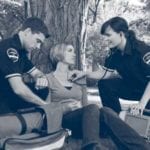
FREQUENTLY ASKED QUESTIONS




The requirements to become a CAC through IBCCES include training at least 80% of forward-facing staff in autism and sensory disorders through IBCCES. The process may also include an onsite review, as well as other support and guidance. The goal is to better prepare staff and management to treat individuals with autism or sensory needs. The certification must be renewed every 2 years with updated training provided for staff at each certified organization.
IBCCES is an independent credentialing organization that was founded in 2001 with the goal to provide specialized training and certification to professionals working with autistic individuals and those with other cognitive disorders. IBCCES is a leader in the training and certification for cognitive disorders, including autism, with certificants in more than 87 countries across the globe.
- • IBCCES works with an advisory board of specialists with expertise in neurology, psychology, behavior therapy, special education, travel, and other disciplines, as well as autistic self-advocates. This advisory board is actively involved and participates in creating the training programs offered by IBCCES, which is evidence-based and promotes best practices from experts in multiple disciplines.
- • IBCCES does not believe there is a “one size fits all” approach and thus brings together the expertise and learnings from multiple areas as well as the viewpoints and experiences of autistic individuals.
IBCCES offers industry and position-specific training, as well as individual professional credentials. Depending on an individual’s position within an organization, their training may have focused on guest service in a recreational space and building empathy and understanding of what autistic visitors may need, or it may have been more extensive (up to 35 credit hours) and include specific techniques and strategies for professionals working within educational or healthcare environments, or specific to scenarios law enforcement or first responders may encounter.
- The credentials and training are meant to supplement or build upon existing departmental and organizational regulations and rules, particularly in a safety or healthcare setting where professional protocols for patient or individual health and safety are already in existence.
- The IBCCES certification alone does not give individuals license to practice medicine (although some IBCCES credentials are approved for billing of therapy services in certain states).
- All staff that complete training through IBCCES complete a competency exam specific to their training program to ensure comprehension.
The training and certification provided by IBCCES are specific to industry and position.
- For travel and leisure-related organizations, such as hotels, attractions, recreation and visitor services, staff are trained to better understand what autism is (and isn’t), how to empathize and understand how autistic individuals experience the world, communicate more effectively, and be aware of common sensitivities and concerns in a recreational environment.
- Corporate staff working toward workforce diversity and inclusion are trained on how to better attract and manage a neurodiverse staff in a professional setting.
- Fire and Medical/First Responders and Law Enforcement staff are trained on autism sensitivity, empathy and understanding what autism is, communication strategies, as well as specific scenarios where they may encounter an autistic person and how to de-escalate or manage those interactions.
- Staff in settings such as therapy, residential programs, and healthcare or education settings receive more extensive training specific to autism, cognitive effects, co-occurring conditions, communication and behavioral strategies, as well as supporting research.
The purpose of the training and certification programs offered by IBCCES is to ultimately improve the experience and outcomes for autistic individuals and those with other related disorders.
- The focus is on building understanding and empathy, as well as improving processes and options for individuals with these needs, and ensuring staff has appropriate tools and strategies when engaging with a neurodiverse population.
- With 1 in 44 children diagnosed with autism (according to the Centers for Disease Control), along with millions of individuals who were never diagnosed but are on the spectrum, and 1 in 6 individuals having a sensory need or sensitivity, the need has never been greater.
